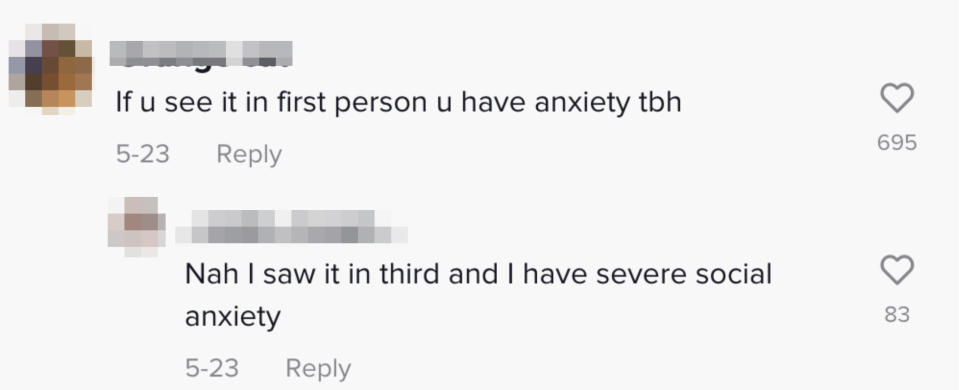People Are Revealing If They See Memories In First-Person Or Third-Person, So I Asked A Psychiatrist What It Means And It’s So, So, So Fascinating
Think of something insignificant in your day, like eating a meal, brushing your teeth, or walking the dog — are you seeing it in first-person through your own eyes, or from third-person, like you are watching yourself do it?

Disney+ / Via giphy.com
This is the viral theory TikTok user @taradreamsofsushi, aka Tara, presented as the "best question you can possibly ask someone," which now has over 5.6 million views and countless people trying to figure out if they see themselves in first-person or third-person perspective:

Including my own group chat:

Of course this theory needed some explanation, so in a follow up video to the original TikTok, Tara explained the difference between a first-person vs. third-person perspective, and what it means about the way you think:
@taradreamsofsushi Replying to @Jennifer Gregorio hope this makes sense ?? lmk
♬ original sound - T
@taradreamsofsushi / Via tiktok.com
According to Tara, "Most people experience both [perspectives], but everyone has a baseline. For first-person baseline, you are very focused on your experience of something rather than the entire situation."
She added that if your baseline is a first-person perspective, you are also "very present" and have "heightened senses." And, she finds these people to be creatives—like "artists, chefs, and designers."
For people with third-person baselines, Tara said, "You are much more self-aware and considerate of the entire environment and situation you are in. You are not just thinking about your experience, you are kind of conscious of what role you play in it."
She added, "But first-person can easily switch into third-person depending on the situation," and vice-versa.
As Tara put it herself, she's not a psychologist or expert, but her theory definitely got me thinking and I wondered if there is real truth to it, so I spoke to Vania Manipod, D.O., a psychiatrist out of Orange County, CA, to weigh in on first-person vs. third-person perspectives and what they mean.
While Vania told me this is certainly "an interesting topic on point of view," she wouldn't call this a valid theory in psychology quite yet. She said, "In order for a theory to become valid, it needs extensive testing and scientific support...some studies exist, but the results have varied." Still, it's certainly true that we have different ways of processing our memories, which Vania points to.

Regarding Tara's theory that people have either a first-person or third-person perspective baseline, Vania told me that "There isn't sufficient scientific evidence to prove that people have baselines." Instead, she said, "Anyone can see themselves in third-person and can vary or switch between first-person and third-person depending on the type of memory they're experiencing."

Tara theorized that for some people, "If you have a really negative experience, your brain might disconnect it from yourself, so you might remember that more in the third-person." And one commenter added that memory retrieval in the third-person might be a "trauma response" because these people "tend to be hyper-focused on our surroundings instead of ourselves."

However, Vania told me that people who have been through trauma may experience their memories in first-person, too, and that trauma memories can be experienced from both perspectives.
"Sometimes if the trauma is recent, they can recall the memory in first-person due to the proximity of the event in addition to the level of distress experienced. Trauma can also be recalled in third-person, especially as a means of distancing themselves from the moments of trauma."

Additionally, she said, "Trauma can be experienced in first-person, then later recalled in third-person, then over time may be recalled in first-person as an individual works through and processes the trauma in therapy."

Vania said, "There are previous studies, such as this 2002 study, that found that [sex workers] who dissociated during a traumatic experience were more likely to retrieve memories of the trauma from the third person, but there aren't any studies that connect trauma to a general third-person perspective of memories." Thus, she wants people to know that we cannot make a "blanket statement" that all memories of trauma are retrieved from the third person.
Other commenters theorized that certain perspectives might be linked to anxiety or a mental health issue, which Vania confirmed: "People who score high in general anxiety tend to experience third-person" memories.

She pointed to this study published in Memory, which "found that individuals in their study who scored high on dissociation and general anxiety reported a third-person general retrieval style." She also said that three studies (here, here, and here) "add to the growing body of evidence" that people with social anxiety tend to view their social memories from the third-person.
While research shows general anxiety and sometimes trauma can be processed in the third person, Vania does not mean this is cause for concern to see a psychiatrist if you experience third-person memories, nor is it a sign of a dissociative disorder.
She told me, "There isn't enough evidence correlating third-person memory retrieval to a psychiatric impairment. And since third-person memory retrieval is common among individuals (whether they have a mental health impairment or not), it's important that we not pathologize third-person memories."

